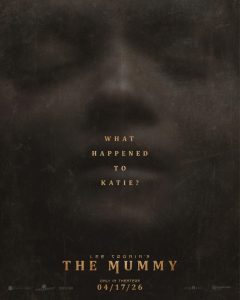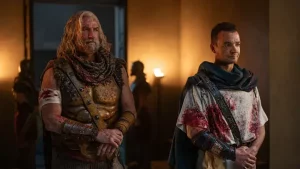
In an engaging conversation with filmmaker Molly Manning Walker we delve into her evolution from cinematographer to director, exploring the creative choices behind her newest film How to Have Sex, which screened at this year’s Sundance Film Festival.
The filmmaker not only directed the film but also served as the cinematographer. The film’s visual elements are striking, with the use of colors and sounds creating a powerful impact. The film is divided into two halves, each with its distinct style and feel. The first half is dreamlike and ethereal, with wide shots and singular music, while the second half becomes more focused and intense, with clashing music and closer camera shots. These decisions were made to immerse the audience in the main character’s experience and create a sense of urgency and tension. One interesting choice in the film is to show what happens after the main character goes missing. This decision was made to heighten suspense and gradually reveal the unfolding events, keeping the audience engaged and invested in the story.
The relationships and reactions of the friends, as well as the character Badger, after the main character’s return, are portrayed effectively. The silence and distant reactions from the friends reflect the emotional naivety often seen in these situations, while also addressing the need for more understanding and support among female friends. The film aims to show that societal pressures come from all angles. Mia gives a fantastic performance as the main character. The film is set in Greece, with its beautiful and flexible location providing the perfect backdrop for the story.
How to Have Sex is a deeply personal and impactful film that sheds light on the experiences of sexual assault and the need for greater understanding and support. With stunning visuals, power ful storytelling, and unforgettable performance by Mia McKenna-Bruce, this film is sure to leave a lasting impression on audiences.
We discussed the film’s design, challenges faced during production, the significance of film festivals, and Walker’s aspirations for societal impact.
During the conversation with the filmmaker, the discussion unfolded around the journey from being a cinematographer to stepping into the director’s chair. Molly Manning Walker expressed contentment in her role as a cinematographer, admitting that directing was somewhat of a shock. However, a compelling desire to tell politically engaged stories led her down the path of directing, ultimately shaping her artistic trajectory.
When discussing the naming of the film, Walker had this to say:
“The title reflects how, when we were that age, we thought we were teaching each other how to have sex, even though we didn’t really know ourselves.”
source: Sundance Film Festival
Reflecting on her film, it was revealed that the story’s design intentionally splits into two halves. The first half aims for a Disneyland-like, ethereal feel, showcasing the characters’ holiday experiences. The second half, however, delves into a more personal space, bringing the audience closer to the protagonist’s perspective. This stylistic choice, according to Smith, enhances the overall cinematic experience:
“The film’s sort of designed in two halves. The first half’s meant to feel like Disneyland, ethereal, like more of three shots with all the girls, like you’re seeing their whole holiday.”
The discussion touched on the challenges faced during the film’s production, facing reluctance in Magaluf, the team shifted their focus and found an engaging location in Malia, which, serendipitously, provided the perfect backdrop for the narrative. Walker emphasized the importance of a flexible and supportive location during the filmmaking process.
“Malia was just a very flexible and engaged location. Like everyone wanted us to be there. And it sort of provided the perfect backdrop.”
When discussing casting for her lead role she added:
“It took about six months of casting, and we were fortunate to find Mia early on. She was a superstar from her audition tape. She has the ability to convey both what’s underneath and how she presents herself on the surface.”
Being featured at Sundance was described as a full-circle moment for Walker, who had previously premiered Scrapper at the festival. The filmmaker expressed the uniqueness of seeing the film in different atmospheres and cultures, with Sundance providing a particularly receptive audience. This experience marked a crucial step in the film’s global journey, landing it in the American cinematic landscape.
“It was amazing to see it with different atmospheres and different cultures. And it was nice to see that land in America because it’s kind of been the missing piece of the puzzle.”
As the conversation shifted to the film’s themes, Walker conveyed her hopes for the audience. She aspires to instill a sense of kindness and understanding, emphasizing that consent is not a binary concept. The film, dealing with sensitive topics, encourages viewers to engage with human experiences and treat one another with empathy.
“I hope that people are kinder to each other, that they understand that consent isn’t a binary thing and that we should be engaged with human experience”
Molly acknowledged that during the filmmaking process, the team did not fully grasp the scale of the impact How to Have Sex would have. Post-finish, the realization set in as they observed how many people felt deeply seen by the narrative. The film became a vehicle for personal and collective realizations surrounding its themes.
“We didn’t really know the scale of it when we were making it. We kind of felt like it was quite personal. And then as we put it out into the world, we saw that.”
Molly Manning Walker mentioned the importance of research groups during the film’s development. These groups provided valuable insights into the evolving conversations around the sensitive topics addressed in the film, highlighting both progress and areas where awareness needed to be heightened.
“We did some great research groups, which really helped us understand where the conversation moved on and where it hadn’t.”
source: Sundance Film Festival
The filmmaker expressed the significance of film festivals, describing the experience of showcasing a film in various atmospheres and cultures. Sundance, in particular, was praised for its brilliant and receptive audiences, contributing to the film’s journey and reception in America.
“Every film festival has a different vibe to it and was really lucky to premiere Scrapper there last year. And so we like it was a real full circle moment to be back there this year with How to Have Sex.”
Balancing artistic vision with the desire for broader audience reach is an ongoing challenge. While wanting to stay true to the film’s artistic integrity, there is a simultaneous recognition of the importance of reaching a wider audience and making a societal impact.
“You want to stay close to her and you kind of want to track it through her eyes. And then when she goes missing, just didn’t want to pick up a new character.”
For aspiring filmmakers, Molly Manning Walker offered a piece of advice:
“Persist and persevere. Acknowledging the challenges of the journey, she emphasized that passion and dedication can indeed make a significant impact in the competitive and ever-evolving world of filmmaking.”
Through her work, she aims to make statements on societal issues, using the medium of film as a powerful tool for social commentary:
“I always felt the need to tell like politically engaged stories. And I guess this is where it’s ended up.”
In conclusion, Walker delivered a final message to emerging filmmakers—continue telling stories that matter. She stressed the profound influence film can have in shaping perspectives and driving positive change, encouraging the next generation of filmmakers to harness the power of storytelling.
“Continue telling stories that matter. She stressed the profound influence film can have in shaping perspectives and driving positive change, encouraging the next generation of filmmakers to harness the power of storytelling.”
We want to thank Molly Manning Walker for taking the time to speak with us.
Does content like this matter to you?
Become a Member and support film journalism. Unlock access to all of Film Inquiry`s great articles. Join a community of like-minded readers who are passionate about cinema – get access to our private members Network, give back to independent filmmakers, and more.












